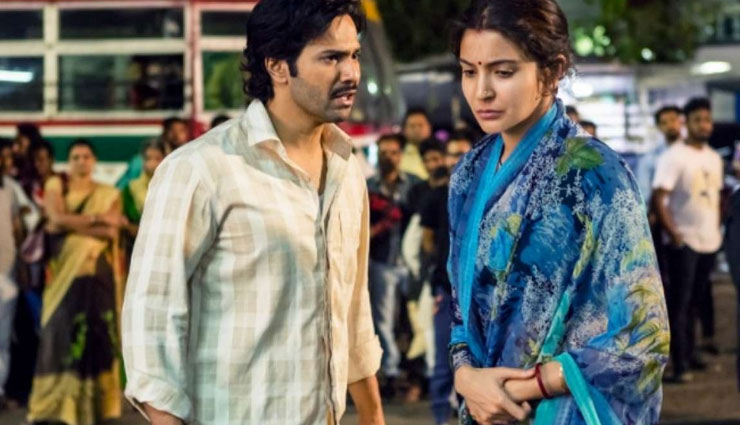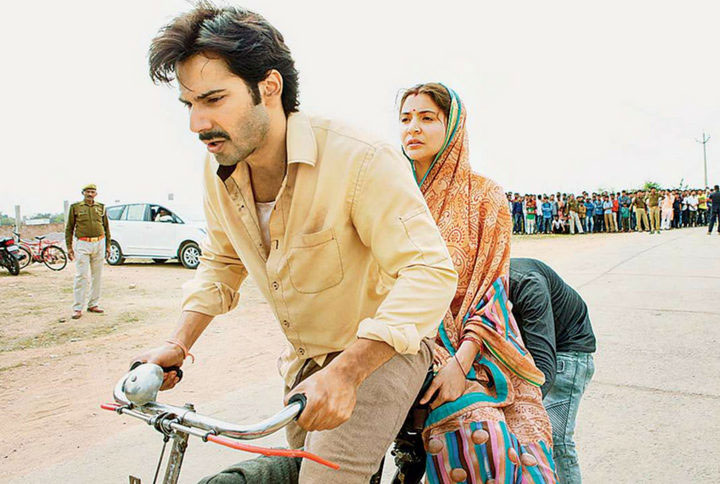- Home›
- Entertainment›
- Sui Dhaaga Music Review: Anu Malik, Varun Grover Weave Together A Hummable Album From The Heartland
Sui Dhaaga Music Review: Anu Malik, Varun Grover Weave Together A Hummable Album From The Heartland
By: Priyanka Maheshwari Thu, 27 Sept 2018 11:27:40

After concocting the unforgettable melody 'Moh Moh Ke Dhage' from Dum Laga Ke Haisha, the trio of director Sharat Kataria, lyricist Varun Grover and music composer Anu Malik reunite to put together the entire album of Sui Dhaaga: Made in India. The five-song package ranges from the gentler 'Chaav Laga' to the more foot-tapping 'Sab Badhiya Hai', but never loses hold of its 'Made in India' texture and the trademark stillness associated with its director.
'Chaav Laga' starts like a typical Sanjay Leela Bhansali ballad but soon, Papon's inviting vocals set the tone of a Sharat Kataria melody. He is joined by Ronkini Gupta, who stole the limelight with the immensely hummable 'Rafu' in Suresh Triveni's Tumhari Sulu last year. Malik balances Papon and Ronkini's honeyed voices with a string instrument that sounds like it is gently brushing against the vocals. Occasionally, a flute also jumps into the mix in order to provide relief. Varun Grover tiptoes on the fine line too, using contrasting rhyming words like 'chaav' (indulgence) and 'ghaav' (injury) to convey the layered emotion of discovering solace in companionship even though it also entails a lot of hardships.
Malik attempts with 'Khatar Patar' what he probably has not ventured into in the past. It is a carnival song by Papon which beautifully captures the symbiotic relationship of a sui (needle) and a dhaaga (thread). Grover's lyrics here are not only fun but also poetic and deep. For a song titled 'Khatar Patar', Grover packs in a lot of fodder for the discerning listeners. This song is almost like a personification of a circus' joker, or any entertainer for that matter, who goes on to smile and make others smile, even though life has not been very kind to them.

In 'Tu Hi Aham', one is tempted to keep listening to Ronkini's heartfelt and full-rounded aalap. But it would rob the listeners of Grover's lyrical genius and Malik's potential when he deviates from the 'Garam Chai Ki Pyali' to give birth to aromatic melodies, like the timeless 'Prem Mein Tohre' in Srijit Mukherjee's period drama Begum Jaan last year. In this song, he facilitates a jugalbandi between a flute and the equally mellifluous Ronkini. Grover once again delves into the contrasting nature of certain rhyming words. Read: aham (ego) and waham (illusion).
The title song, 'Sui Dhaaga', is more intense and communal than 'Khatar Patar', which has the same chorus, but not as nuanced as that one. In fact, 'Khatar Patar' has more qualifications to be the title song. But it would have been the macro voice of 'Sui Dhaaga' that would have given it an edge over the more intimate 'Khatar Patar'. Malik ropes in Divya Kumar to front the song but the usually reliable singer's textured voice does not always manage to convey the embedded tenderness of this album. The lyrics have an anthem-like appeal but the tabla, along with Divya's restrained vocals, ground what could have been a verbose, 'inspirational' song.
The final song, 'Sab Badhiya Hai', is only a promotional track and will not feature in the film. When there is a Varun Dhawan-Anu Malik reunion in the film, the makers cannot really resist a dance number. But even this additional song stays rooted. Sukhwinder Singh embraces folk nuances and incorporates various UP-Bihar harkats into the song. Malik also uses characteristically desi elements like the dhol, the harmonium and rhythmic whistling to ensure that the song stays true to the film's theme. Varun's lyrics here are simple. They introduce the world of the film's lead characters, Mamta and Mauji, and the world they inhabit. At the same time, the song is also an inspirational one as it suggests unity is the only way to feel 'Sab Badhia Hai'.
However, not everything is 'sab badiya' about the album. Malik and Grover go the old school way and compose three stanzas for every song, while they could have easily done away with one. Also, when you have behemoth expectations after an eternal melody like 'Moh Moh Ke Dhaage', it is not easy to come up with an album that lives up to them. The desi songs of Sui Dhaaga may be 'Made in India' but they are certainly not made in heaven.





